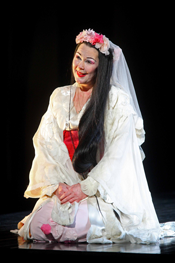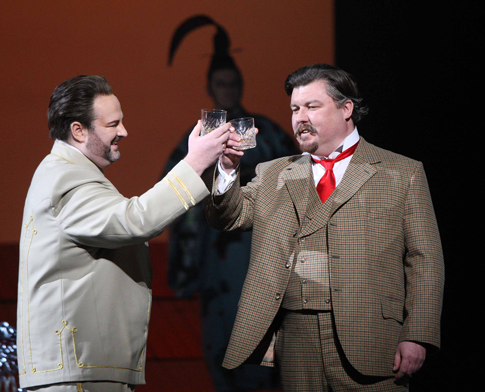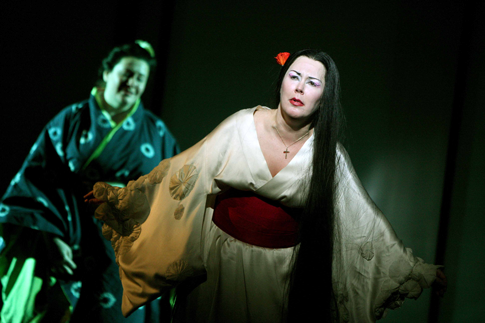Recently in Performances
While I eagerly seized upon an opportunity to hear Angelika Kirschlager live for the first time, having written in very recent weeks about not one but two of the star mezzo’s current CD releases, I ventured to Frankfurt’s Alte Oper feeling a little bit like her stalker.
When I worked in the Archives of the Met, I was custodian of several hundred costumes, many from the days when divas traveled with steamer trunks full of things run up just for them, by the finest designers, with the most glamorous materials, in the colors and styles that suited the ladies themselves.
There is nothing redeeming about Sir John Falstaff, one of Shakespeare’s most lively comic characters and the subject of Verdi’s final opera, and yet, inexplicably, we love him.
What constitutes an “international opera star” these days, anyway?
The Metropolitan Opera audience loves its Wagner, and the management for the last several decades has, alas, made sure we aren’t spoiled: it’s a rare season that gets more than two production revivals of Wagner, and some years there have been none.
With her performance of the “Four Last Songs,” ably partnered by Michael Tilson Thomas and his San Francisco Symphony, Deborah Voigt emphatically confirmed her place as one of the glories of the current roster of Strauss interpreters.
John Adams, whose opera Nixon in China set the bar for post-minimalism in the lyric theatre, has once again scored a success with his latest work.
Wagner’s all-conquering chic made apocalyptic music-dramas drawn from folklore the ideal of the nationalistic era; every serious opera composer of the time felt obliged to attempt something in that line.
In this country art and politics are rarely bedfellows — strange or otherwise; indeed, it’s seldom that the two meet under the same roof.
Regarded, until the modern vogue for earlier masters, as the senior surviving grand master of opera, Gluck never quite becomes fashionable and never quite vanishes.
There is no middle ground in War and Peace — or, rather, it’s all middle ground, like a battlefield, and you may feel as if every soldier in Russia (and in France) has marched over you.
Once upon a time, we used to only dream about a stellar pairing like Barcelona’s Gran Teatre del Liceu has fielded for their current offering on display: “La Cenerentola.”
Enough ink was spilled last year gushing over Valencia’s new Calatrava-designed opera house and Arts and Science park that I had been chomping at the bit for the opportunity to take in a performance there as soon as my availability and, more important, the availability of a still-very-hard-to-find ticket coincided.
Do we too easily take Richard Strauss for granted? The question is prompted by the superlative production of “Frau ohne Schatten” that was the highlight of the fall season at the Chicago Lyric Opera.
Watching The Queen of Spades staged by a Russian company is often an unforgettable experience.
If Belfast in Northern Ireland isn’t a city that immediately springs to mind as a centre of musical excellence then it’s not for want of talent, initiative and professionalism within its cultural community.
After the triumph of his fifth opera, Ernani, Verdi could have gone on writing howling melodramas and made a mint.
Not long ago, English National Opera declared an intention to capitalise on its name and history by placing greater emphasis on English works.
Despite 19th-century Russia’s reputation as an Italian opera haven, Verdi’s late masterpiece Otello found acceptance there only with great difficulty, even though in its 1889 premiere the title role acquired a great local interpreter in the Mariinsky Theater primo uomo, Nikolai Figner.
At the curtain call for the first night of WNO’s new production of the infrequently performed Khovanshchina director David Pountney wore a simple Russian shirt.
Performances

10 Feb 2008
Madam Butterfly at ENO
Anthony Minghella's visually-arresting staging, a co-production with New York's Metropolitan Opera and the Lithuanian National Opera, returned this month to its original home at the London Coliseum after a gap of two years.
Michael Levine's set designs and Peter Mumford's lighting are utterly beautiful, from the floating lanterns and curtain of flowers which descend upon Butterfly and Pinkerton on their wedding night to the dramatic brush-stroke effect of the unravelling of Butterfly's crimson obi at her suicide. Despite Minghella's film credentials, it is not a cinematic approach as such, though the steep rake and the giant mirror above the stage create a 'widescreen' effect which suits the shape of the Coliseum's stage and concentrates the eye.
Although the staging keeps Pinkerton as very much a one-dimensional character, the production's Bunraku puppetry – expertly supplied by Blind Summit Theatre – gives the audience a little glimpse into the beliefs and perceptions which cause him to act the way he does. The exquisitely lifelike puppets, most notably used to portray Butterfly's son, blur the boundaries between artifice and reality, and it becomes almost easy to accept Pinkerton's perception of the Japanese as pretty playthings, not quite real. Sometimes the puppets seem more natural than the human performers.
Indeed, there is a risk with such a staging that it could sacrifice substance for style, and as such it needs a very strong cast to balance it out and reach the heart of Puccini's opera . I confess I was apprehensive about Judith Howarth's debut in the title role, as her (very successful) career has been almost entirely in the lyric coloratura repertoire. I need not have worried; the soft-grained, pearly quality of her soprano, though not the sound we are used to hearing in the role, proved equal to Puccini's characteristically heavy scoring and an appropriate timbre for this most youthful of operatic heroines. Her stage presence and mannerisms were just as credible, and she was shattering in her vulnerability. It was perhaps a misjudgement to pair her with as vocally powerful a Suzuki as the excellent Karen Cargill, but this is really a minor criticism.
As Pinkerton, Gwyn Hughes Jones, returning from the original run of the production, was in fine voice. He was allowed 'Addio, fiorito asil' despite the modern fashion to do without it, but it seems superficial. Sharpless – the one character who can see the situation from every angle and is left with the responsibility for damage limitation – was given a warm and dignified portrayal by Ashley Holland.
 Gwyn Hughes Jones as Pinkerton / Ashley Holland as Sharpless
Gwyn Hughes Jones as Pinkerton / Ashley Holland as Sharpless
Musically this revival was in every way superior to the original run in 2005. David Parry was once again in the pit, giving a sensitive and never self-indulgent reading of the score. Words came across well, except in parts of Act 1; members of ENO's chorus made clearly-defined characters of their cameo roles as wedding guests. But above all it was a remarkable personal triumph for Judith Howarth.
Ruth Elleson © 2008
 Karen Cargill as Suzuki / Judith Howarth as Madam Butterfly
Karen Cargill as Suzuki / Judith Howarth as Madam Butterfly


